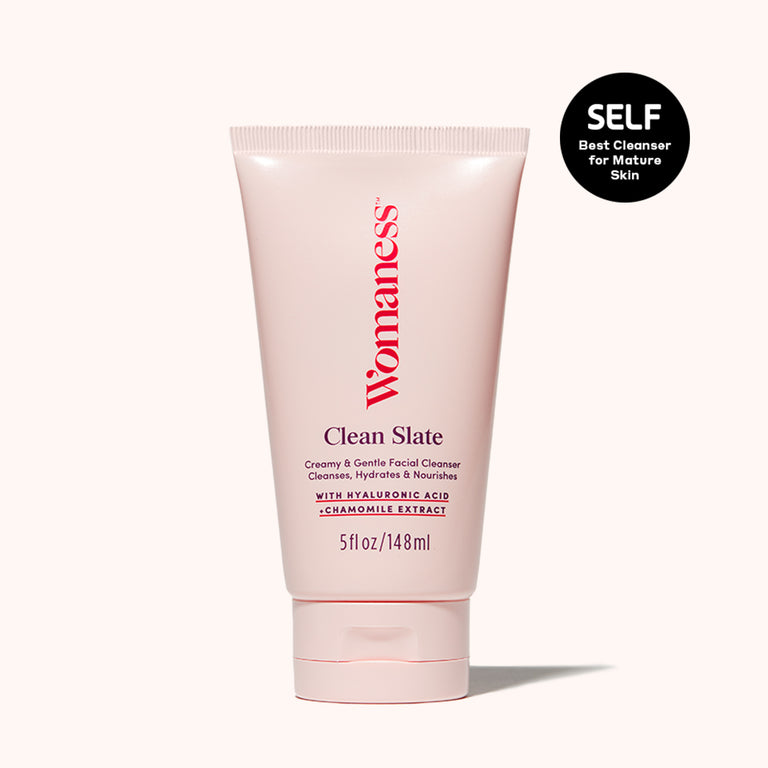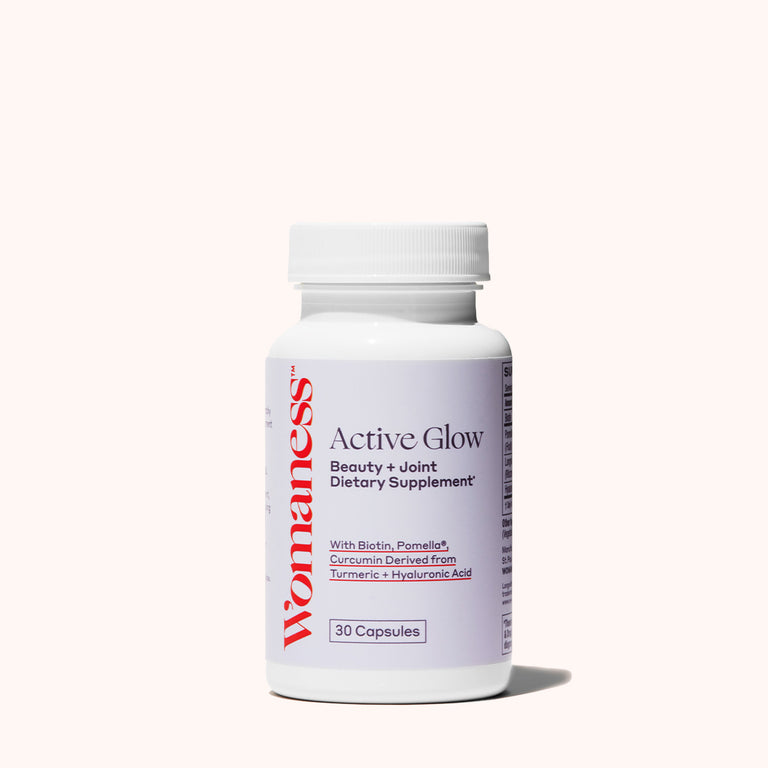By Allie Lansman, RDN, LD 5-Minute Read
 Allie Lansman, RDN, LD is a freelance nutrition and sustainability writer, educator, and consultant. As a dietitian, she is passionate about equipping current and former menstruators to make empowering nutrition choices throughout their lives through inclusive articles—with an eco-consciousness flair!
Allie Lansman, RDN, LD is a freelance nutrition and sustainability writer, educator, and consultant. As a dietitian, she is passionate about equipping current and former menstruators to make empowering nutrition choices throughout their lives through inclusive articles—with an eco-consciousness flair!
If you’ve begun your perimenopause journey and notice a fullness, tightness, or swelling in your stomach, you may be experiencing menopause belly. Simply put, menopause belly is bloating caused by the body retaining excess water or gas during the menopause transition.
While bloating is a common symptom of perimenopause, there’s no denying it can also be uncomfortable and frustrating. Along with a doctor-prescribed treatment plan, lifestyle changes can significantly affect your bloating severity. Especially what you eat.
What is the Root Cause of Perimenopause (& Menopause!) Belly Bloat?
Perimenopausal bloating occurs in the stomach and other body parts, lasting from a few hours to several days. Typically, bloating happens during the day and can potentially continue throughout menopause.
While several factors can provoke bloating, the root cause of perimenopausal belly bloat is an imbalance of the hormones estrogen and progesterone.
Despite low estrogen levels being a hallmark of menopause, estrogen levels increase sharply before eventually dropping during perimenopause. On the other hand, progesterone levels are low during perimenopause. High estrogen and low progesterone levels stimulate the body to retain water to the point where the stomach becomes uncomfortably full and extended.
"The root cause of perimenopausal belly bloat is an imbalance of the hormones estrogen and progesterone."
Your Gut Microbiome, Hormones, & Menopause-Related Bloating
When addressing how to beat menopause-related bloating and balancing hormones, the “gut” (i.e., the intestines) may be the last body system you’d consider. However, the gut—more specifically the colonies of trillions of microbes living inside the intestines, known as the gut microbiome—plays a crucial role in hormone regulation and bloat control.
A flourishing, healthy gut microbiome containing diverse colonies of beneficial microbes is vital for your wellbeing. It aids in digestion, supports nutrient absorption, and maintains symbiotic relationships with body systems like the brain, skin, immune system, and more. The microbiome also has a reciprocal connection with the endocrine system, which produces and maintains stable levels of hormones including estrogen and progesterone.
On the other hand, an unwell or damaged gut microbiome can have the opposite effect. Changes related to menopause, unstable levels of estrogen, can negatively alter the makeup of the microbiome by decreasing beneficial microbes and allowing harmful colonies of bacteria to grow. These menopause-related shifts in the gut can lead to poor digestion, reduced nutrient absorption, poor hormone control, and ultimately, increased bloating.
Need to Beat the Bloat? Try These 6 Foods
Now that we’ve added the gut microbiome on top of hormone regulation, reducing perimenopause bloat may sound even more overwhelming. But, based on current research, it’s actually less complicated than it seems!
What you eat is essential for supporting a flourishing gut microbiome, which can then aid in balancing hormones during perimenopause. As a result, it's a potential game-changer in bloating frequency and severity. To make it easier, here are six foods you can try adding to your daily diet with beneficial nutrients, chemical compounds, and/or microbes that can help beat the bloat:
1. Fermented foods
In your gut microbiome, bacteria cultures make up the bulk of the trillions of beneficial microbes. Regularly including fermented foods in your diet can help fortify and increase diversity of these beneficial bacteria cultures as they contain large amounts of probiotics, or live bacteria strains.
While research is still being conducted on which bacteria strains are the most helpful in preventing menopause bloating, Lactobacillus acidopholus is a strain found effective in alleviating other menopause symptoms such as fatigue, hot flashes, and vaginal dryness. Lactobacillus-containing foods you can add are:
-
Kimchi
-
Yogurt
-
Kefir
-
Sourdough bread
2. Omega-3s
Omega-3 fatty acids provide a host of benefits to your gut by combatting inflammation.
Chronic inflammation—continuous irritation and swelling of skin tissues—is a common symptom during perimenopause and can last through postmenopause. Long-lasting inflammation causes adverse impacts throughout your body. However, in the gut, a persistent swelling can reduce bacteria diversity in your gut microbiome, damage intestinal tissues, and alter hormone regulation.
These “healthy fats” help beat bloat by reducing chronic inflammation to help restore harmony to the gut. Foods rich in omega-3s include:
-
Seaweed and algae
-
Nuts and seeds
-
Plant-based oils
-
Fatty fish (like salmon or sardines)
3. High-fiber foods
Now, this recommendation might be a bit surprising.
While fiber is excellent for gut health and serves as a prebiotic—a food source for beneficial gut bacteria—it has been known to potentially contribute to bloating. This bloating is caused by the gas produced when bacteria consumes these fibers. However, whether or not fiber stimulates bloating in the gut depends on the type and amount of fiber you eat.
There are two types of fiber: soluble and insoluble. Both are found in all plant-based foods and are essential for good gut health and digestion, but certain foods contain more or less of each.
Soluble fiber is prebiotic. As it is digested by gut bacteria, it is fermented and produces gas. Commonly found in fruits, legumes, and cruciferous (sulfur-containing) vegetables, they’re something you’ll want to eat in smaller portions to lessen bloating.
On the other hand, insoluble fiber cannot be digested and does not produce gas. Plants with higher amounts of insoluble fiber—whole grains, nuts, and potatoes—can be eaten with less risk of bloating.
"Whether or not fiber stimulates bloating in the gut depends on the type and amount of fiber you eat."
4. Antioxidants
Menopause is thought to induce oxidative stress, which is the damage to cells and tissues caused by harmful reactive oxygen molecules (i.e., free radicals). This damage is a leading contributor to a variety of menopause symptoms, including irritability or poor mood, hot flashes, and—you guessed it—unbalanced hormones.
In the gut, oxidative stress contributes to perimenopause bloating by initiating chronic inflammation and reducing gut microbe diversity.
To stave off oxidative stress, you should focus on antioxidants—compounds that defend against and destroy free radicals. Antioxidants come in a variety of forms, from vitamins and minerals to beneficial plant-based chemicals called phytonutrients. Foods with the highest ratio of antioxidants are:
-
Berries
-
Dark chocolate
-
Green tea
-
Ginger
-
Turmeric
5. Digestive enzymes
Digestion—the process of breaking down food into smaller, absorbable nutrients—occurs in the stomach. When not digested properly, larger food molecules are at risk of being fermented by gut bacteria when they reach the intestines. In turn, gas is produced and causes bloating.
To improve digestion in the stomach, foods that naturally contain digestive enzymes can be helpful in preventing excess bloating. These include:
-
Papaya
-
Miso
-
Honey
-
Avocado
6. Fluid-balancing foods
High estrogen and low progesterone levels in perimenopause cause your body to hold on to excess water. It may “make sense” to think limiting your daily fluid intake can help shed the extra water, but it can actually cause the opposite.
When you dehydrate yourself, the body works overtime to rebalance your fluid levels. The result? Even more bloating.
Instead, address water-retention bloating by remaining hydrated and promoting fluid balance. There are several high-water content foods that support hydration that you can easily add, such as:
-
Melon
-
Bok choy
-
Jicama
-
Prickly pear
Caution: Know Your Bloating Trigger Foods
“Trigger foods” can worsen menopause bloating. Everyone’s triggers are different, but the foods you may want to be cautious of are:
-
Foods high in saturated fats, refined sugars, and salt
-
Carbonated drinks
-
Sugar alcohols
-
Alcohol, specifically beer
Trust Your Gut to Find Perimenopause Bloating Relief
If perimenopause bloating has been a struggle, you’re not alone. Adding foods that address the root causes can help ease the discomfort and potential bloating severity.
Remember, this list isn’t extensive—and you can trust your gut to tell you what's right for addressing your perimenopause symptoms. If you need diet support, ask your physician or gynecologist to refer you to a dietitian specializing in perimenopause and menopause care.
More For You
7 Changes to Make to Lose Weight in Menopause
What Should I Eat During Menopause?
The Ins & Outs of Intermittent Fasting in Menopause






